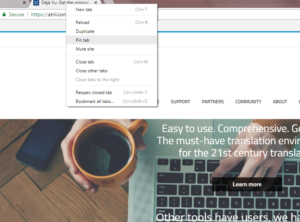Welcome to the news section!
Here you will find all the news related to ATRIL and the translation market.
Cool computer tricks everyone should know
The old adage goes that time is money. And indeed in today’s fast-paced world, it’s one of the most precious resources. And if you spend long days click-clacking, you want to do things as efficiently as possible. That’s why, we’ve compiled the following list of cool computer tricks to streamline your work. Enjoy!
Cool computer tricks to try out now!
#1. Your active window: shaken, not stirred
Do you often happen to have several windows open? This can quickly lead to big chaos and mess on your desktop. But with just a small movement, you can make all the unused windows go away, leaving just the one you’re currently using. If you click and hold your active window and then shake it vigorously, all the other ones get minimized at once, so you don’t have to do minimize them manually one by one. Once you want them maximized back again, just repeat the same gesture once again.
#2. To the left, to the right
When trying to get things organized on your desktop, you often move windows dragging them to the edge of the screen. The thing is, most people do it with a mouse. But there is a quicker way to do this. Just press Window key, and, while holding it, click one of the arrows on your keyboard. The selected window will move to the right or left of the screen, or to the next monitor, if you’re using two.
#3. Get back that tab
Closing a browser tab by accident is as common as it’s frustrating. Especially if it was a very interesting article you were looking for a long time and now you can’t remember the URL. But what can you do? Laboriously look through your browser history? Try to trace back your keyword searches and then dig through dozens of results displayed by the search engine back again? Well, of course not! Resorting to the following keyboard combination: CTRL + SHIFT + T will bring back the closed tab. And not only that: it will open exactly in the place where you finished reading.
#4. Prevent accidental closing
Knowing how to restore a closed tab is one thing, but you can easily prevent it from happening in the first place. Just right-click on the tab and pin it. Once you’ve read the article and decide you no longer need it, do the same to unpin it.

#5. Open links with one quick click of the mouse
Opening links in new tabs is not a rocket science. You right-click a link and select open in a new tab. Quick and efficient. But it becomes more time-consuming if you’ve got several links to open. Luckily you can speed up the process. All you need to do is to click the link with your middle mouse button (or the scrolling wheel). As a result, the link will automatically open in a new tab.
#6. Skim through your resources faster
When working on a project, whether while actually translating, or just when reading on a topic, you often need to browse through numerous resources. While no computer trick will teach you to actually read faster, it can help you move around a website in a more efficient manner. If you hit the spacebar while reading, it will scroll down the page by one screen length. That way, you will be able to get to the more useful sections of the text quicker. Hitting SHIFT + SPACEBAR does the reverse.
#7. Get screenshots ready in seconds
If you need to take screenshots for your job, you might find that one useful. There’s an even quicker way to do this than the good old Snipping Tool. Just hit ALT + PRINTSCREEN. It will only take the screenshot of your active window, so in most cases, no further editing will be necessary.
#8. Delete one word at a time
Translating a text takes a lot of thinking, re-thinking, correcting and editing. Changing your mind is part of the process. When deleting a sentence to rephrase the text, hit CTRL+ BACKSPACE. In this way you will delete one word at a time, instead of doing it letter by letter.
#9. Protect your PC from outsiders
This one is useful for both freelancers working from home, as well as office goers. Whenever you have to leave your computer, use the combination of Windows key + L to lock it. That way your kids, roommates or colleagues won’t have access to your computer and your work will be safe. It will also protect you from all sorts of unwanted office pranks.
#10. Use YouTube more efficiently
YouTube can be a great source of entertainment, but also a useful resource when researching a topic or just looking for information. That’s why, this list of cool computer tricks wouldn’t be complete without a hack related to this platform. The majority of people already know that hitting the spacebar pauses a video. The problem is that if you haven’t clicked on the video beforehand, it will scroll down the page. An alternative option is pressing “K”, as it pauses it every time. Clicking “J” will cause the video go backward 10 seconds, while hitting “L” will do the opposite. – The clip will go forward 10 seconds.
Achieving work-life balance – best strategies and practices
Whether you are a long-time freelancer or just starting an adventure with self-employment, there are a few things you can expect. Some are positive, like independence and a sense of responsibility for what you do. Others can become a problem if you don’t pay enough attention to them: fatigue, burnout, too little time and too much work. Or you have a long to-do list and you know you could make it, but something always gets in the way. There is always something to detach you from work: unplanned business trip, an illness, an equipment failure, or an unexpected visit. The reasons might be mutltifold. The thing with being a freelancer is that since you don’t work steady hours, your schedule is much less predictable and maintaining work-life balance may be challenging. You get to be so preoccupied with work that you don’t have any time for other activities.
The idea behind the work-life balance is not to divide your time equally for your professional and personal activities. It is more about achieving satisfaction in all areas of your life. The ability to combine work, family and passion to create a complementary whole may seem like a dream, but it’s worth trying to make it happen.

Photo credit: CWA Union on Visualhunt / CC BY-NC-SA
Is there a reason to worry?
Studies have shown that the conflict between work and private life carries a number of negative consequences for the employee, their family and –in the long run – for the quality of their work. Therefore, it’s worthwhile to ask yourself a few questions:
- Do you work for more than 40 hours a week?
- Do you often find yourself thinking about work or actually working during your family time?
- Does thinking about work-related matters keep you up at night?
- Do you often feel so exhausted after work that you don’t have the energy for anything?
- Do you sometimes get work-related phone calls late in the evening or when on holiday?
- Is it becoming more and more difficult to find time for your hobbies?
- Do you have trouble remembering when was the last time you took some time off?
If you answered “yes” to most of the questions, the ability to maintain a work-life balance might not be your strongest asset. High chances are that soon your personal life might suffer as a consequence. This imbalance can also negatively affect your health causing nervousness and tension, headaches, weight loss or even depression.
Fighting for work-life balance
Make a realistic schedule and stick to it
It can be a anything, a simple notebook, a phone app, some desktop software or a calendar. The most important thing is that you won’t make the mistake many freelancers make and won’t add too many items to the list. Take into account your daily responsibilities such as shopping, picking up children from kindergarten, etc. Domestic duties are time-consuming, but many people forget about them when planning a day.
This method will allow you to check how much time you have left for work and adjust the number of tasks you engage in. Try not to overload your calendar and always leave a margin for a new project that can appear.
Be assertive and learn to say “no”
Regardless of their language pair, this may well be the most difficult word for a freelance translator, but it’s worth to learn to use it.
It is not just about refusing to take on new project from your clients. Saying “no” can also mean putting your foot down when it comes to distractions that interfere with your schedule. This can be too frequent get-togethers with friends, or taking over a greater part of household duties kust because you work remotely.
Don’t accept new gigs if their deadlines overlap with your current projects. It will mean twice as much work at the same time to finish both jobs on time. If you know next month you are busy, it’s safe to let some of the new tasks go.
Change your surrounding
You probably already arranged yourself a place for work. Whether it is a separate office or a work-dedicated area in your living room, that’s where you feel most comfortable. But sometimes it might be interesting to mix things up a bit. Try working from a coffee house or a library for a change, and see how it works for you. Even if it may be far from perfect, this can give you a chance to break the routine. As a result, your job will feel less monotonous and uninspiring.
Include relaxation time in your weekly schedule
Plan your free time, so that you will know exactly how you’re going to spend it. If you will arrange it ahead of time, you will have a chance to get some distance and catch a break from your professional duties. Actually putting leasure time as a separate entry in your scheduler may seem silly, but can be beneficial in the long run. Sometimes if you don’t plan your free time, you might let it slip through your fingers. If you promise yourself you’ll actually use it for something you truly enjoy, it will feel much more rewarding and will let you recharge your batteries.
Translation specialization for your freelance career
Offering online translation services gives you the opportunity to reach with your offer to virtually unlimited audience. Such broad clientele comes with a wide range of translation needs. From translation of private or corporate correspondence, through resumes and cover letters article and websites to scholarly publications. Marketing yourself as an individual who can translate any text is a common practice, especially among those entering the profession. But the reality is that not every job is for everybody and you just can’t be an expert in everything. At some point you will at least have to consider choosing a translation specialization.

The importance of choosing a translation specialization.
Translating a text from a field of knowledge you have no idea about is like trying to explain to someone how to dance in an email. You can take your time explaining each movement in details, but in most cases, the results will hardly be anything but a disappointing clumsiness.
Translating a specialist text from outside of your expertise can indeed be like walking through a minefield. And there’s more to specialized knowledge than just the language barrier. It’s also a matter of having an in-depth knowledge of the industry and its practices, current trends and challenges, Naturally, it is possible to do a quick research for the purpose of a given text: look things up on the internet or dictionaries, but such haphazard training is likely to result in errors and distortions.
Therefore it might be necessary to become a specialized translator. How to choose an area of expertise in the translation field and what are the most important factors to take into account?
How to choose your niche?
An intuitive option for some, is to follow their own passions and specialize in an area they already find interesting. And there are obvious benefits to this solution. First of all, you would be doing what you already enjoy and care for! They say if you pick a job you love, you won’t have to work a single day in your life. But what if the thing you have a passion for is too narrow a niche to attract many clients and become successful?
Another way to go is to choose your translation specialization with respect to demand, competition and access to information. That’s why it sometimes happens that the specialization finds you, not the other way round. Once you get to become an expert in the field of pharmaceuticals, finance or law, you are way ahead of the all-purpose translators.
The more niche specialization, the greater demand for it on the market. This principle applies to translations from and into the most popular languages. If you are one of thousands German translators, a specialization gives you bigger chances to stand out and achieve success.
Having a specialization allows proper targeting and makes you gain expert knowledge. However, everyone who wants to work as a translator must be aware that this profession requires constant training, gaining knowledge and development, along with many years of practice. Success depends to a large extent on your own work. Nevertheless, it is worth managing your education in order to acquire skills that will be useful as soon as possible.










